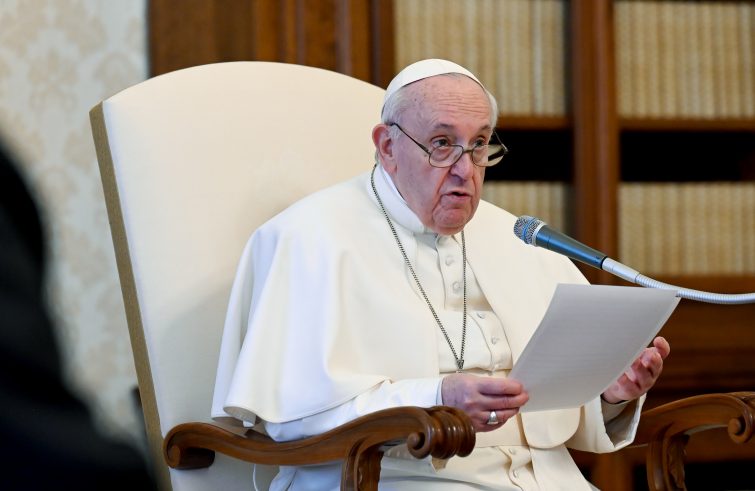
“The day after tomorrow, God willing, I will go to Iraq for a three-day pilgrimage”, the Pope said at the end of today’s General Audience livestreamed from the Library of the Apostolic Palace, devoted to Prayer and the Trinity. “For a long time I have wanted to meet those people who have suffered so much; to meet that martyred Church”, Francis said, with an announcement: “In the land of Abraham, together with the other religious leaders, we shall also take another step forward in brotherhood among believers.” “I ask you to accompany this apostolic journey with your prayers, so that it may unfold in the best possible way and bear the hoped-for fruits.” The appeal: “The Iraqi people awaited Saint John Paul II, who was not permitted to go. One cannot disappoint a people for the second time. Let us pray that this journey will be a good one.”
“Jesus revealed the identity to us, this identity of God, Father Son and Holy Spirit”,
the Pope said in the opening remarks of his catechesis: “It is Jesus who opened up Heaven to us and projected us into a relationship with God.” “To dialogue with God is a grace”, Francis said: “We are not worthy of it, we have no rights to claim, we ‘limp’ with every word and every thought… But Jesus is the door that opens us to this dialogue with God.”
“God looks at the hands of those who pray: to make them pure it is not necessary to wash them; if anything, one must refrain from evil acts.”
The example of Saint Francis who prayed in the Canticle of the Sun: “no man is worthy of naming you”. “But perhaps the most moving acknowledgment of the poverty of our prayer – Francis notes – came from the lips of the Roman centurion who one day begged Jesus to heal his sick servant. He felt totally inadequate: he was not a Jew, he was an officer in the detested occupying army. But his concern for his servant emboldens him, and he says: ‘Lord, I am not worthy to have you come under my roof; but only say the word, and my servant will be healed’. It is the phrase we also repeat in every Eucharistic liturgy.”
“For what great nation is there that has a god so near to it as the Lord our God is to us?”
With this phrase, repeated in Deuteronomy, the Pope explains the closeness of God, whereby Jesus’ presence defines our religion. “Why should humanity be loved by God?”, the question and the answer: “There are no obvious reasons, there is no proportion… So much so that most mythologies do not contemplate the possibility of a god who cares about human affairs; on the contrary, they are considered bothersome and boring, entirely negligible.” “Some philosophers say that God can only think of himself”, said the Holy Father: “If anything, it is we humans who try to convince the deity and be pleasing to his eyes”, to ingratiate ourselves with “a mute God, an indifferent God.” “There is no dialogue”, the Pope added in unwritten remarks: “It is Jesus who reveals God’s heart.
What kind of God is prepared to die for people? Which one? What kind of God loves always and patiently, without demanding to be loved in return? What God accepts the tremendous lack of gratitude of a son who asks for his inheritance in advance and leaves home, squandering everything?”.
“Jesus tells us through his life the extent to which God is a Father”, Francis remarked: “No one is Father like he is. The paternity that is closeness, compassion and tenderness.” “Do not forget these three words, that are God’s style”, the unscripted invitation: “it is his way of expressing his paternity towards us.” “A God who loves humanity: we would never have had the courage to believe in him, had we not known Jesus”, Francis concluded: ” It is the scandal that we find inscribed in the parable of the merciful father, or in that of the shepherd who goes in search of the lost sheep.
We are the recipients of a love that has no equal on earth.
This is the grace of our faith. We really could not have hoped for a higher vocation: the humanity of Jesus – God who came close to us in Jesus – made available to us the very life of the Trinity, and threw wide open this door of the mystery of the love of the Father, of the Son and of the Holy Spirit.”











